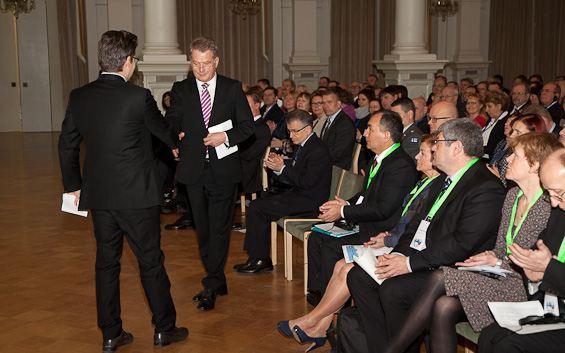
Copyright © Office of the President of the Republic
President of the Republic of Finland Sauli Niinistö attended the opening forum of the Gulf of Finland Year at the Helsinki City Hall on Tuesday, 21st January. He is the patron for the theme year together with the Presidents of Estonia and Russia.
The ecological state of the Gulf of Finland has been a grave concern for many decades. “While significant progress has been made in combating pollution – especially the two main nutrients, phosphorus and nitrogen – the situation is far from satisfactory”, president Niinistö said at the opening forum. “We need to do more. And we also need to know more.”
During the Gulf of Finland Year, the scientific communities of Finland, Russia and Estonia are working together to study the marine ecosystem of the Gulf of Finland, in order to provide the best possible updated information for decision-makers. A strong knowledge base will facilitate cost-effective measures that can provide both environmental and economic benefits.
Nutrients and the excessive use of natural resources are not the only threats to the Gulf of Finland. The volume of shipping and energy transports in the Gulf has been growing, causing increased risk of accidents. We must pay ever more attention to safety measures and to the capacity to combat oil spills, president Niinistö said.
The Gulf of Finland Year 2014 is a common programme for Finland, Estonia, and Russia to improve the state of the gulf. The theme year will comprise of research co-operation, environmental education and public events.
“The Gulf of Finland Year is not only for researchers, politicians and officials. In all our three countries, we can already see that there are many stakeholders – municipalities, enterprises, NGOs and schools – who are willing to take part in the activities of the year. – – I see the theme year as a possibility for our three nations to act together in order to attain goals that are valuable for all of us”, president Niinistö said.
“This is a duty that we can neither postpone nor transfer to future generations. It is our responsibility.”

